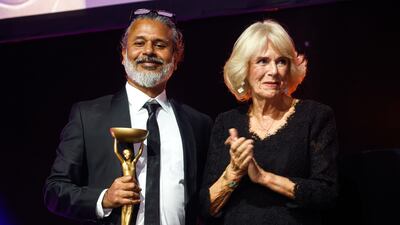Shehan Karunatilaka, who was announced as the winner of the 2022 Booker Prize on Monday evening, said the attack on Sir Salman Rushdie caused him to “self-censor” and discard work amid concerns for his own family.
The Sri Lankan author said that when writing “semi-political” work there was always consideration for whether it would “cost you more than you anticipated”.
The writer won the coveted prize with his second novel, The Seven Moons Of Maali Almeida, two months after the attack in New York state.
Sir Salman was stabbed around a dozen times by 24-year-old Hadi Matar while speaking onstage at the Chautauqua Institution on August 12.
The Indian-born British novelist has been nominated for the Booker Prize multiple times, winning in 1981 for Midnight’s Children, which went on to be named the “Booker of Bookers” in 2008.
Karunatilaka said he had been in the process of publishing a collection of short stories when he heard of the attack.
“I discarded a couple of short stories, which I don’t think were offensive to any religion,” he told Press Association after his win.
“But my wife said: ‘Yeah, can you not do that? You’ve got two young kids? This story is not that good. Just leave it out’.
“I did find myself and in the balance of it, I thought … a short story, I can easily take it out.
“So I have self-censored and things like that, and it is a concern when you’re writing semi-political stuff in a place like Sri Lanka — who are you going to offend and is it really going to cost you more than you anticipated?
“I think that this is something that hangs over all of us if we’re writing in south Asia, especially writing about politics or religion and things like that.
“So yeah, I think it’s something that I do think about and it does affect what I write.”

At this year’s Booker Prize ceremony, which took place at the Roundhouse in London, tribute was paid to Sir Salman by fellow Booker Prize nominee Elif Shafak, who said the literary imagination is “one of our last remaining democratic spaces”.
“Freedom of speech is like the oxygen we need in order for fiction to survive and thrive,” she said.
“You don’t normally think about the oxygen around you, you take it for granted, until it starts to diminish, until it starts to drop dramatically.
“And then you can’t breathe. And then you can’t write. And then you feel intimidated. And I think that’s exactly where we are right now around the world.
“The attack against Salman Rushdie was a horrific, despicable act of violence, and it was not an isolated incident.
“Words have become heavy — anything and everything you write, from politics, to sexuality to history, questioning official history, can offend the authorities, especially in countries where democracy is shattered to pieces.”
Matar is due to appear in court next month having previously plead not guilty to attempted murder and assault.
Published by the independent press Sort Of Books, Karunatilaka's winning novel is a darkly comic murder mystery set in Colombo in 1990 during the Sri Lankan civil war.
It follows Maali Almeida, a war photographer, as he tries to find out who killed him.
Karunatilaka said his country has had economic problems and the news that he had been shortlisted “brightened things up”.
Karunatilaka spoke to Camilla, Queen Consort at the awards. He said she discussed Sri Lanka with him and he told her where he was when he received the news that he had been shortlisted.
He said his wife was in a four-day petrol queue while he was walking the children to school.
“And yeah, that’s when I got the text,” he said, adding that his wife managed to get a full tank of petrol.
“And that night a friend came over and goes, ‘Wow, congratulations, full tank of petrol. Oh by the way, well done on the Booker’.
“And he was only half joking,” he said.


